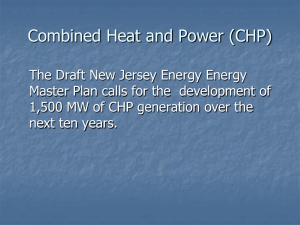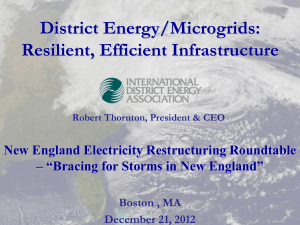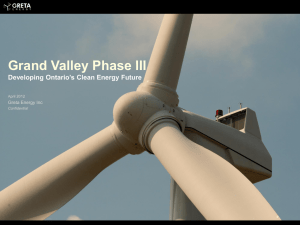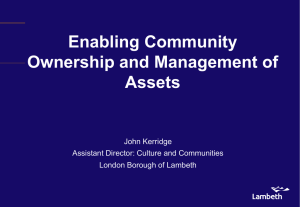Part 1 - Base Cities
advertisement
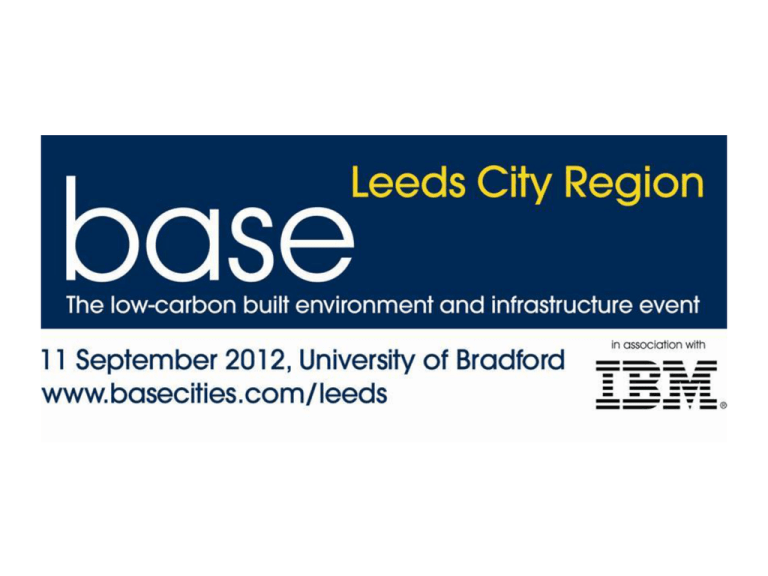
ENERGY: Taking Forward The City Region’s Unique Renewable Energy Opportunities Simon Pringle, head of sustainability, BDO (chair) Mikele Brack, director, public sector at GE, on combined heat and power Richard Goodfellow, head of energy and utilities, Addleshaw Goddard and member of the LCR Green Economy Panel John Carolin, director of business development, Biogen Download pt 1 contains slides from: Mikele Brack, director, public sector at GE, on combined heat and power Download pt 2 contains slides from: Richard Goodfellow, head of energy and utilities, Addleshaw Goddard and member of the LCR Green Economy Panel John Carolin, director of business development, Biogen Island mode Mikele Brack Director, Public Sector GE Global Operations Distributed Generation: The business case for CHP 11th September 2012 The Changing UK Energy Market Changing Generation Mix & Demand Profiles Active Distribution Networks Variable Generation Active Demand Large Generation Peak Commuting Time 60 Electricity Demand (GW) 55 Variable generation 50 Peak Commuting Time Variable generation Smart(er) grids & meters, energy storage Generation 2020 Demand ~ 15 GWh (daily) - 1.5 million vehicles 45 Optimal Charging Period Typical winter daily demand Time of use tariffs 40 12,000 miles p.a. 35 23:00 22:00 21:00 20:00 19:00 18:00 17:00 16:00 15:00 14:00 13:00 12:00 11:00 10:00 09:00 08:00 07:00 06:00 05:00 04:00 03:00 02:00 01:00 00:00 30 Time of Day Distributed Generation Inflexible Generation Demand 5 The Changing UK Energy Market What does this mean? Today‘s Energy Market Tomorrow’s Energy Market ~75GW Significant coal power plants 4 GW reserve Generation – 5% Predictable demand Low levels of renewable generation ~110GW Increasingly digital Increase in urban population 15% generation low carbon Regulation to support energy efficiency Carbon pricing 8 GW reserve Generation – 7% 9 GW Coal Retirements 37 GW of renewables on line Residential bills will double Backup generation becoming more important & valuable The Power Delivery Model is Evolving CHP - Cogeneration Fuel flexibility and tailor-made solutions Landfill gas Coal mine gas Sewage gas Associated petroleum gas Island mode Special gases Cogeneration (Natural gas) Greenhouse applications Biogas Business Benefits Summary - CHP Reduced CO2 Reduced Energy OPEX 1MW e CHP CCHP: coolth, heat & electricity • Energy costs typically 20% • Asset payback is now < 4 yrs • Guy’s & St Thomas’ (6MW): £1M/pa savings • Savings may increase with new government policies around CHP MWh tonne MWh MWh £/MWh £/MWh Gas Elec Fuel Total O&M O&M Total OPEX CAPEX £MM £MM £MM £/MWh £MM £MM £MM Term Discount Rate PV Years £MM 15 8% 2.33 NPV Simple payback £MM yrs 1.33 3.7 Reduced Risk Exposure to rising energy prices • Guy’s & Thomas’ savings increased by 30% in last 3 years • Assuming energy prices rise faster than interest rates, economics continue to improve Period '12 Before After Diff 68434 58699 -9736 11972 10641 -1331 26572 37913 11341 16101 7994.7 -8106 29.0 29.0 80.0 80.0 Primary Energy CO2 Gas Elec Gas Elec 0.77 1.29 2.06 0.00 2.06 1.10 0.64 1.74 6.00 0.05 1.79 1.00 0.33 -0.65 -0.32 -0.05 -0.27 1.00 >85% efficiency: reduces C02 • Hot water and building heating provided from waste heat, absorption chillers create cooling • Assuming 1 MW: annual CO2 reduction –1k tonne • Key part of Government Energy Policy for decentralised energy Increased Security Community facilities & developments • CCHP becomes primary source, grid secondary, significantly reducing risk of delays from DNO outages CCHP – Combined Cooling Heat & Power – 4 year payback GE Confidential - Distribute to authorized individuals only. Optimising Distributed CHP Additional Equipment for new or retrofit facility Balance of Plant – Back Up Generation, Switchgear and UPS GAS ENGINE & CHP MODULE Grid Backup Gas Heat for Building Electricity for Building • • • • • Optimise CHP Design Install Factory & Site Testing Commission Maintain • • • • • Optimise BOP Design Install optional Factory & Site Testing Commission Maintain Virtual Power Plant - STOR Export Electricity Diesel Backup GE hosted Bureau for the automated management of the customer owned assets. (Communications – via wireless/ethernet etc) Modify existing equipment for synchronisation to grid • Switchgear mods • Synchronisers • Remote Terminal Units (RTUs) for communications Jointly Optimise Overall System Design & Service Package for Critical Plant What is STOR? Harnessing existing back up assets to generate new income Short Term Operating Reserve (STOR) This is the provision of additional active power from generation provided by ‘Asset holders’ who have installed standby capacity. Asset Holders – Capacity …are paid for making their generating capacity available to the National Grid Asset Holders - Generation …are also paid when the generation is utilised by the National Grid (at times of peak load, or where traditional generation has failed). Examples are any industry with currently installed standby generation – eg – water utilities, hospitals, banks, data centres, farming… Aggregator GE Energy manages the aggregation of multiple smaller generation providers (Asset Holders) into 3MW lots which are required by NG. Why is STOR required? Less Predictable Generation & Changing Demand Challenges Scenario New inflexible generation, wind & solar Hot sunny day, air conditioning on maximum Changing demand patterns from Electric Vehicles England are in the World Cup Final Changing customer behaviour Emergency mtc -1 GW generation goes off line Increasing demand for power Grid reserve capacity is now critical STOR Asset Holders spare backup generation sits available Grid sends signal to generation Generation comes on until it is not required Backup generation goes back into standby mode Business Case GE provide STOR income stream GE undertakes service as a turnkey provider, maintain, operate and trade backup asset • Annual health check and remedial reporting • Annual asset servicing* Available Hours Per Year • 24 hour reactive service Running Hours Per Year • Electronic Management System • Complete maintenance and performance history (from date entered into GE STOR) Availability Income Utilisation Income Other savings due to STOR (existing service) • 1 7008 55 MW Available Contractual and “bid-in” services Total Income £ 19,120.75 £ 10,642.50 £ 4,000.00 £ 33,763.25 Fuel ( aprox 265 litres p/h @ £.63 p/l) £ Asset owner benefit from STOR £ 24,581.00 Also provide guaranteed maintained backup infrastructure 9,182.25



